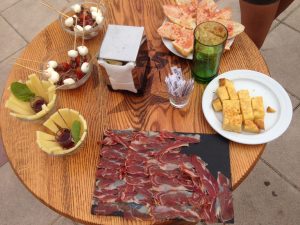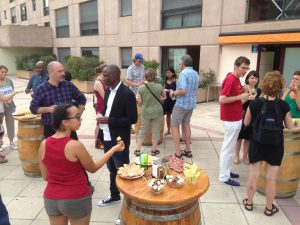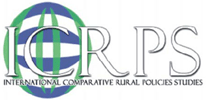
Tapas at AUB
Robert Zabawa Photo
Tapas anyone?
By John Devlin
The 14th edition of the ICRPS Summer Institute was off to a great start on Sunday evening with Tapas at Restaurant CAU on the campus of the Universitat Autònoma de Barcelona. New and old friends spent a couple of hours remembering past ICRPS and anticipating what will come over the next two weeks as participants discuss rural policy and explore rural areas in Catalonia, Spain.
The Summer Institute will run from 25 June to 8 July. The institute will involve approximately 30 graduate students and almost as many faculty members from universities around the world. Sessions will be supplemented with field trips, group work, and student presentations.

ICRPS Opening Reception, July 25, 2017
Robert Zabawa Photo
Innovative Experiential Learning
The ICRPS Summer Institute provides a unique opportunity for students from a range of countries in the Organisation for Economic Cooperation and Development (OECD) to meet and work together on comparative rural policy issues and make invaluable research and networking contacts. Faculty involved in ICRPS represent the disciplines of anthropology, economics, environmental studies, geography, indigenous studies, planning, policy studies, political science, and sociology.
ICRPS Summer Institutes are held in North America and Europe in alternating years. Since 2004, over 330 graduate students from North America and Europe have benefited from the innovative blend of classroom instruction, rural visits, and research meetings.
The first ICRPS Summer Institute was held at the University of Guelph in 2004. Since then, it has been convened in Leuven, Belgium (2005); Brandon, Manitoba (2006); Solsona (Barcelona), Spain (2007); Missouri, USA (2008); Inverness, Scotland (2009); Oregon, USA (2010); Songdal, Norway (2011); Rimouski, Québec (2012); Bertinoro, Italy (2013); Toluca, Mexico (2014); Dublin and Galway, Ireland (2015); and Fairbanks, Alaska (2016). The 2017 Summer Institute will be held in Bellaterra (Barcelona), hosted by the Universitat Autònoma de Barcelona.
Catalonia has a diversified agricultural sector and a powerful food industry. Pork production and processing of meat, wine, olive oil and fruit are the main agri-food sectors with strong exports.
Catalonia is ecologically diverse with a wealth of landscapes, habitats and species and a strong rural tourism industry. But the region also faces strong urban pressures from population spread, infrastructure development and the growth of tourism. Rural-urban linkages will be a key element of this year’s Summer Institute and we are going to see many of them up close.
But first perhaps one more… I think I see a familiar face just arriving!
